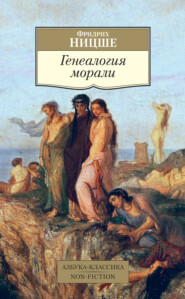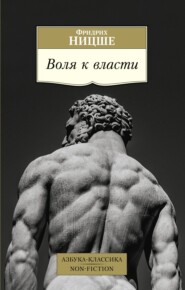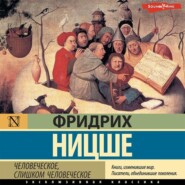По всем вопросам обращайтесь на: info@litportal.ru
(©) 2003-2024.
✖
We Philologists
Настройки чтения
Размер шрифта
Высота строк
Поля
If a man approves of the investigation of the past he will also approve and even praise the fact – and will above all easily understand it – that there are scholars who are exclusively occupied with the investigation of Greek and Roman antiquity: but that these scholars are at the same time the teachers of the children of the nobility and gentry is not equally easy of comprehension – here lies a problem.
Why philologists precisely? This is not altogether such a matter of course as the case of a professor of medicine, who is also a practical physician and surgeon. For, if the cases were identical, preoccupation with Greek and Roman antiquity would be identical with the "science of education." In short, the relationship between theory and practice in the philologist cannot be so quickly conceived. Whence comes his pretension to be a teacher in the higher sense, not only of all scientific men, but more especially of all cultured men? This educational power must be taken by the philologist from antiquity; and in such a case people will ask with astonishment: how does it come that we attach such value to a far-off past that we can only become cultured men with the aid of its knowledge?
These questions, however, are not asked as a rule: The sway of philology over our means of instruction remains practically unquestioned; and antiquity has the importance assigned to it. To this extent the position of the philologist is more favourable than that of any other follower of science. True, he has not at his disposal that great mass of men who stand in need of him – the doctor, for example, has far more than the philologist. But he can influence picked men, or youths, to be more accurate, at a time when all their mental faculties are beginning to blossom forth – people who can afford to devote both time and money to their higher development. In all those places where European culture has found its way, people have accepted secondary schools based upon a foundation of Latin and Greek as the first and highest means of instruction. In this way philology has found its best opportunity of transmitting itself, and commanding respect: no other science has been so well favoured. As a general rule all those who have passed through such institutions have afterwards borne testimony to the excellence of their organisation and curriculum, and such people are, of course, unconscious witnesses in favour of philology. If any who have not passed through these institutions should happen to utter a word in disparagement of this education, an unanimous and yet calm repudiation of the statement at once follows, as if classical education were a kind of witchcraft, blessing its followers, and demonstrating itself to them by this blessing. There is no attempt at polemics · "We have been through it all." "We know it has done us good."
Now there are so many things to which men have become so accustomed that they look upon them as quite appropriate and suitable, for habit intermixes all things with sweetness; and men as a rule judge the value of a thing in accordance with their own desires. The desire for classical antiquity as it is now felt should be tested, and, as it were, taken to pieces and analysed with a view to seeing how much of this desire is due to habit, and how much to mere love of adventure – I refer to that inward and active desire, new and strange, which gives rise to a productive conviction from day to day, the desire for a higher goal, and also the means thereto · as the result of which people advance step by step from one unfamiliar thing to another, like an Alpine climber.
What is the foundation on which the high value attached to antiquity at the present time is based, to such an extent indeed that our whole modern culture is founded on it? Where must we look for the origin of this delight in antiquity, and the preference shown for it?
I think I have recognised in my examination of the question that all our philology – that is, all its present existence and power – is based on the same foundation as that on which our view of antiquity as the most important of all means of training is based. Philology as a means of instruction is the clear expression of a predominating conception regarding the value of antiquity, and the best methods of education. Two propositions are contained in this statement. In the first place all higher education must be a historical one, and secondly, Greek and Roman history differs from all others in that it is classical. Thus the scholar who knows this history becomes a teacher. We are not here going into the question as to whether higher education ought to be historical or not; but we may examine the second and ask: in how far is it classic?
On this point there are many widespread prejudices. In the first place there is the prejudice expressed in the synonymous concept, "The study of the humanities": antiquity is classic because it is the school of the humane.
Secondly: "Antiquity is classic because it is enlightened – "
28
It is the task of all education to change certain conscious actions and habits into more or less unconscious ones; and the history of mankind is in this sense its education. The philologist now practises unconsciously a number of such occupations and habits. It is my object to ascertain how his power, that is, his instinctive methods of work, is the result of activities which were formerly conscious, but which he has gradually come to feel as such no longer: but that consciousness consisted of prejudices. The present power of philologists is based upon these prejudices, for example the value attached to the ratio as in the cases of Bentley and Hermann. Prejudices are, as Lichtenberg says, the art impulses of men.
29
It is difficult to justify the preference for antiquity since it has arisen from prejudices:
1. From ignorance of all non-classical antiquity.
2. From a false idealisation of humanitarianism, whilst Hindoos and Chinese are at all events more humane.
3. From the pretensions of school-teachers.
4. From the traditional admiration which emanated from antiquity itself.
5. From opposition to the Christian church; or as a support for this church.
6. From the impression created by the century-long work of the philologists, and the nature of this work. It must be a gold mine, thinks the spectator.
7. The acquirement of knowledge attained as the result of the study. The preparatory school of science.
In short, partly from ignorance, wrong impressions, and misleading conclusions; and also from the interest which philologists have in raising their science to a high level in the estimation of laymen.
Also the preference for antiquity on the part of the artists, who involuntarily assume proportion and moderation to be the property of all antiquity. Purity of form. Authors likewise.
The preference for antiquity as an abbreviation of the history of the human race, as if there were an autochthonous creation here by which all becoming might be studied.
The fact actually is that the foundations of this preference are being removed one by one, and if this is not remarked by philologists themselves, it is certainly being remarked as much as it can possibly be by people outside their circle. First of all history had its effect, and then linguistics brought about the greatest diversion among philologists themselves, and even the desertion of many of them. They have still the schools in their hands: but for how long! In the form in which it has existed up to the present philology is dying out; the ground has been swept from under its feet. Whether philologists may still hope to maintain their status is doubtful; in any case they are a dying race.
30
The peculiarly significant situation of philologists: a class of people to whom we entrust our youth, and who have to investigate quite a special antiquity. The highest value is obviously attached to this antiquity. But if this antiquity has been wrongly valued, then the whole foundation upon which the high position of the philologist is based suddenly collapses. In any case this antiquity has been very differently valued, and our appreciation of the philologists has constantly been guided by it. These people have borrowed their power from the strong prejudices in favour of antiquity, – this must be made clear.
Philologists now feel that when these prejudices are at last refuted, and antiquity depicted in its true colours, the favourable prejudices towards them will diminish considerably. It is thus to the interest of their profession not to let a clear impression of antiquity come to light; in particular the impression that antiquity in its highest sense renders one "out of season?" i.e., an enemy to one's own time.
It is also to the interest of philologists as a class not to let their calling as teachers be regarded from a higher standpoint than that to which they themselves can correspond.
31
It is to be hoped that there are a few people who look upon it as a problem why philologists should be the teachers of our noblest youths. Perhaps the case will not be always so – It would be much more natural per se if our children were instructed in the elements of geography, natural science, political economy, and sociology, if they were gradually led to a consideration of life itself, and if finally, but much later, the most noteworthy events of the past were brought to their knowledge. A knowledge of antiquity should be among the last subjects which a student would take up; and would not this position of antiquity in the curriculum of a school be more honourable for it than the present one? – Antiquity is now used merely as a propædeutic for thinking, speaking, and writing; but there was a time when it was the essence of earthly knowledge, and people at that time wished to acquire by means of practical learning what they now seek to acquire merely by means of a detailed plan of study – a plan which, corresponding to the more advanced knowledge of the age, has entirely changed.
Thus the inner purpose of philological teaching has been entirely altered; it was at one time material teaching, a teaching that taught how to live, but now it is merely formal.[2 - Formal education is that which tends to develop the critical and logical faculties, as opposed to material education, which is intended to deal with the acquisition of knowledge and its valuation, e. g., history, mathematics, &c. "Material" education, of course, has nothing to do with materialism – Tr.]
32
If it were the task of the philologist to impart formal education, it would be necessary for him to teach walking, dancing, speaking, singing, acting, or arguing · and the so-called formal teachers did impart their instruction this way in the second and third centuries. But only the training of a scientific man is taken into account, which results in "formal" thinking and writing, and hardly any speaking at all.
33
If the gymnasium is to train young men for science, people now say there can be no more preliminary preparation for any particular science, so comprehensive have all the sciences become. As a consequence teachers have to train their students generally, that is to say for all the sciences – for scientificality in other words; and for that classical studies are necessary! What a wonderful jump! a most despairing justification! Whatever is, is right,[3 - The reference is not to Pope, but to Hegel. – Tr.] even when it is clearly seen that the "right" on which it has been based has turned to wrong.
34
It is accomplishments which are expected from us after a study of the ancients: formerly, for example, the ability to write and speak. But what is expected now! Thinking and deduction. but these things are not learnt from the ancients, but at best through the ancients, by means of science. Moreover, all historical deduction is very limited and unsafe, natural science should be preferred.
35
It is the same with the simplicity of antiquity as it is with the simplicity of style: it is the highest thing which we recognise and must imitate; but it is also the last. Let it be remembered that the classic prose of the Greeks is also a late result.
36
What a mockery of the study of the "humanities" lies in the fact that they were also called "belles lettres" (bellas litteras)!
37
Wolf's[4 - Friedrich August Wolf (1759-1824), the well-known classical scholar, now chiefly remembered by his "Prolegomena ad Homerum." – Tr.] reasons why the Egyptians, Hebrews, Persians, and other Oriental nations were not to be set on the same plane with the Greeks and Romans: "The former have either not raised themselves, or have raised themselves only to a slight extent, above that type of culture which should be called a mere civilisation and bourgeois acquirement, as opposed to the higher and true culture of the mind." He then explains that this culture is spiritual and literary: "In a well-organised nation this may be begun earlier than order and peacefulness in the outward life of the people (enlightenment)."
He then contrasts the inhabitants of easternmost Asia ("like such individuals, who are not wanting in clean, decent, and comfortable dwellings, clothing, and surroundings; but who never feel the necessity for a higher enlightenment") with the Greeks ("in the case of the Greeks, even among the most educated inhabitants of Attica, the contrary often happens to an astonishing degree; and the people neglect as insignificant factors that which we, thanks to our love of order, are in the habit of looking upon as the foundations of mental culture itself").
38
Our terminology already shows how prone we are to judge the ancients wrongly: the exaggerated sense of literature, for example, or, as Wolf, when speaking of the "inner history of ancient erudition," calls it, "the history of learned enlightenment."
39
According to Goethe, the ancients are "the despair of the emulator." Voltaire said. "If the admirers of Homer were honest, they would acknowledge the boredom which their favourite often causes them."
40
The position we have taken up towards classical antiquity is at bottom the profound cause of the sterility of modern culture; for we have taken all this modern conception of culture from the Hellenised Romans. We must distinguish within the domain of antiquity itself: when we come to appreciate its purely productive period, we condemn at the same time the entire Romano-Alexandrian culture. But at the same time also we condemn our own attitude towards antiquity, and likewise our philology.
41

















